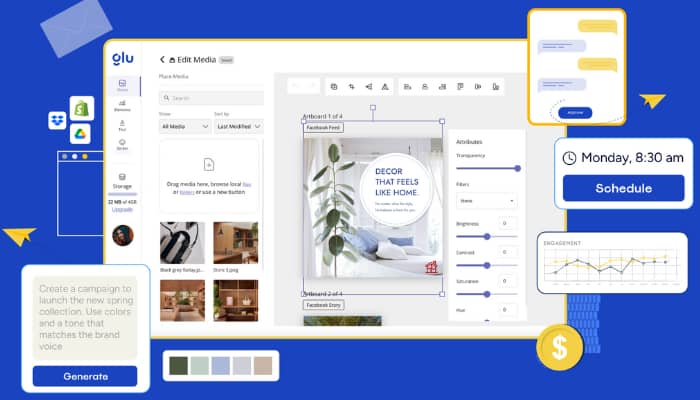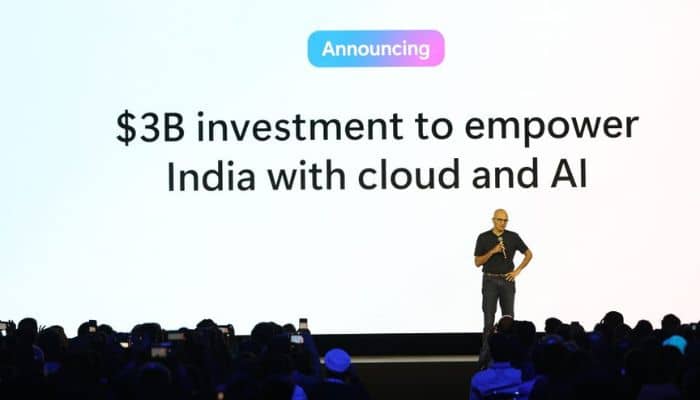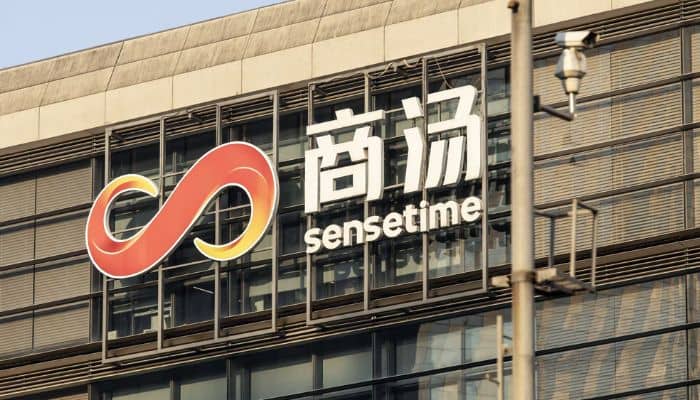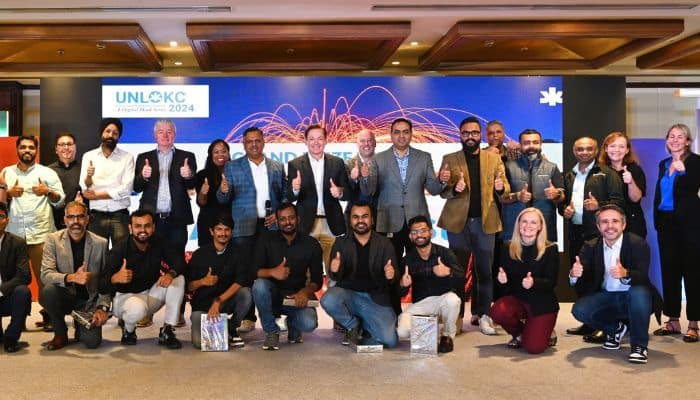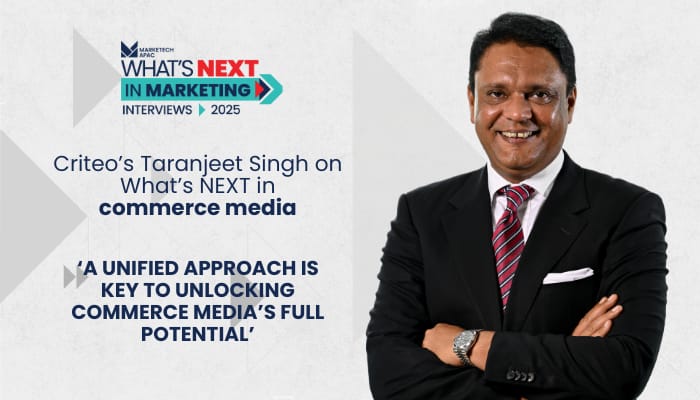Commerce media is transforming advertising by enabling brands to engage shoppers with precision throughout their purchase journey. Leveraging rich commerce data across platforms empowers advertisers to target high-value audiences, deliver personalised experiences, and achieve measurable results. AI plays a key role in streamlining processes and predicting shopping behaviours with remarkable accuracy.
Amid rising privacy regulations and industry fragmentation, commerce media offers a unified, data-driven approach to navigate these challenges. Prioritising first-party data, harnessing AI, and fostering cross-platform collaboration help advertisers build meaningful connections and stay competitive in a dynamic digital landscape.
In our latest What’s NEXT in Marketing interview, Taranjeet Singh, managing director of Venture Markets, APAC at Criteo, explores how commerce media is transforming advertising with data-driven targeting and AI while addressing challenges like fragmentation and privacy regulations to build a unified, privacy-first ecosystem.
Unlocking audience insights with commerce media
Commerce media empowers advertisers by connecting them with high-value consumer audiences across retail media networks, the open internet, and social platforms. The outcome is precision-driven targeting that seamlessly engages consumers throughout their purchasing journey.
“Commerce media allows advertisers to speak to the audiences that matter most at all stages of their purchase journey, wherever and whenever they shop, which increases the likelihood of conversion,” Singh explained.
He went on to highlight how Criteo enables advertisers to activate and monetise these audiences through its Commerce Media Platform, leveraging a vast network of 17,000+ advertisers, 3,100 brands, and 225 retail media networks. By utilising deep commerce insights, Criteo helps predict and shape shopping behaviours while ensuring privacy-safe first-party data through closed, authenticated environments like retailer sites and social platforms.
Singh shared an example of how Yanadoo, a South Korean self-development platform, used Criteo’s OneTag with Dynamic Loader to retarget users who hadn’t converted. By tracking key events like course purchases and registrations, Yanadoo built detailed customer profiles, allowing Criteo’s AI to optimise bidding and ad delivery. This approach improved targeting across the open web, enabled the collection of valuable first-party data, and delivered measurable outcomes as consumers progressed through their purchase journey—an essential focus for advertisers.
In addition to Yanadoo, Swiggy, an India-based on-demand convenience platform, partnered with Criteo to enhance its offsite retail media campaigns, helping brands reach high-intent audiences across the open internet and OTT platforms.
Singh highlighted the success of this collaboration with brands like Kellogg’s, which drove conversions and attracted new-to-brand shoppers. Through Criteo’s tracking tools, Kellogg’s achieved a ROAS of 1.9 (above the industry average of 1.55), a 25% new-to-brand rate, and reached over 50% of its target audience.
Speaking on the data, Singh explained, “Commerce media empowers advertisers to use first-party data for targeted audience engagement throughout the purchase journey. By combining precise targeting with closed-loop measurement, brands can drive conversions, acquire new customers, and maximise ROI across channels, transforming data-driven advertising.”
AI: Driving precision and automation in commerce media
For Singh, artificial intelligence is the backbone of modern commerce media, streamlining operations while enhancing personalisation and performance. From automating ad delivery to generating predictive insights, AI transforms how advertisers connect with their audiences.
“AI-powered tools save advertisers time by automating tasks like audience targeting, ad personalisation, and performance tracking,” Singh noted. “This precision fosters higher engagement and measurable outcomes, such as increased revenue per user and return on ad spend.”
He also mentioned how Criteo’s advanced AI solutions, like ‘Commerce Audiences,’ enhance ad delivery through behavioural clustering and predictive modelling, while also leveraging engagement scores to prioritise users most likely to take action.
Singh explained that AI tools in Criteo’s Commerce Audiences, such as ‘Embeddings,’ detect behavioural links between users, products, and websites to cluster audiences effectively. Engagement scores prioritise users likely to act, while predictive modelling targets the most promising audiences, reducing reliance on real-time data.
“AI engines use commerce data to craft highly relevant campaigns, connecting advertisers with retailers for efficient scaling. As technology matures, it will continue to drive innovation in commerce media, empowering advertisers to deliver exceptional customer experiences and drive growth,” he highlighted.
Addressing industry fragmentation
Despite commerce media’s potential, Singh highlighted challenges like fragmentation and lack of standardisation, which can limit campaign scalability and ROI. According to him, a unified approach is key to unlocking commerce media’s full potential.
“Industry fragmentation can lead to inconsistent campaign performance and a loss of up to 20% in revenue for retail media networks,” Singh warned, citing Forrester’s report.
Criteo addresses fragmentation with a unified commerce media platform that caters to both marketers and media owners. For marketers, it offers Commerce Max and Commerce Growth, while media owners benefit from Commerce Grid and Commerce Yield, supporting everyone from enterprise brands to smaller retailers.
Singh also highlighted Criteo’s launch of SKU-based planning in Commerce Max, enabling brands to buy sponsored product ads across multiple retail networks with a single workflow. This simplifies campaign management, allowing for efficient targeting of in-market shoppers at scale. With AI-driven recommendations and closed-loop measurement, Criteo optimises campaigns, helping marketers focus on driving sales.
“This cohesive approach minimises fragmentation, streamlines media buying processes, and mitigates addressability challenges, empowering clients to achieve stronger results across the advertising ecosystem,” he stated.
Navigating privacy regulations
With evolving privacy regulations, the reliance on first-party data has become critical for advertisers. Singh emphasised that as third-party cookies phase out, businesses are focusing on first-party data for more targeted, privacy-compliant advertising. Regulations like GDPR and Apple’s App Tracking Transparency drive this shift, ensuring companies can deliver relevant marketing while respecting user privacy.
“By embracing privacy-first strategies and advanced technologies, businesses are better equipped to comply with regulations and build consumer trust, while also adapting to an industry where data privacy is now a foundational principle,” he commented.
Singh further explained that as the industry shifts to a privacy-first environment, Criteo is well-positioned to provide solutions that support partners in this new landscape. The company focuses on three core pillars: first-party data, Google’s Privacy Sandbox, and closed environments.
Criteo has developed a unique shopper graph across both the demand and supply sides, enabling privacy-safe activation through hashed emails, and ensuring 1:1 addressability while protecting user privacy. Partnering with Google, Criteo leverages the Privacy Sandbox to maintain key addressability functions without third-party cookies, reaching 63% of global browser traffic. Additionally, Criteo’s Commerce Media Platform helps brands engage high-intent shoppers across 225 global retailers and millions of logged-in users on platforms like Meta, ensuring precise targeting while maintaining privacy standards.
According to Singh, as privacy regulations reshape advertising, companies are increasingly prioritising first-party data to ensure compliance and effective, privacy-respecting marketing strategies.
“This shift is fostering a more transparent and user-centric digital landscape. Criteo, along with other industry players, is supporting this evolution by offering technologies that help brands adapt to these changes,” he added.
Future trends in commerce media
When asked about the key trends shaping the future of commerce media, Singh pointed to shifting consumer behaviour as a major influence. As consumer habits evolve, marketers must adapt by integrating performance media with commerce media to effectively engage audiences throughout the entire shopping journey, from discovery to purchase.
This shift toward integrated strategies helps brands deliver relevant, seamless experiences at every touchpoint. With Criteo’s AI-driven algorithms, marketers can eliminate guesswork and stay ahead of changes in consumer behaviour, ensuring campaigns remain effective.
Additionally, fragmentation and inconsistent standards continue to hinder the full potential of commerce media. To address this, industry leaders are uniting supply and demand, connecting publishers and retailers with meaningful demand, and enabling advertisers to reach key audiences across the purchase journey. As the industry evolves, standardising measurement has become crucial.
Singh noted how Criteo tackles this challenge with four commerce media solutions that provide full-funnel marketing activation and monetisation for all players in the ecosystem.
“By 2025, addressability solutions will be at the forefront of the industry’s shift to a cookieless future,” he predicts. “Criteo is prepared with tailored strategies to address these concerns, including our three-pronged approach of first-party data, Privacy Sandbox integration, and closed environments.”
***
As consumer behaviour continues to evolve, so will commerce media. Advertisers and retailers will increasingly focus on creating meaningful, personalised connections with shoppers across all touchpoints, ensuring that every interaction is relevant and impactful.
Commerce media is not just a tool—it’s a transformative strategy that empowers brands to maximise their impact in an increasingly complex advertising ecosystem. With AI-driven insights and privacy-first solutions paving the way, the future of commerce media will be defined by precision, personalisation, and enhanced performance.


